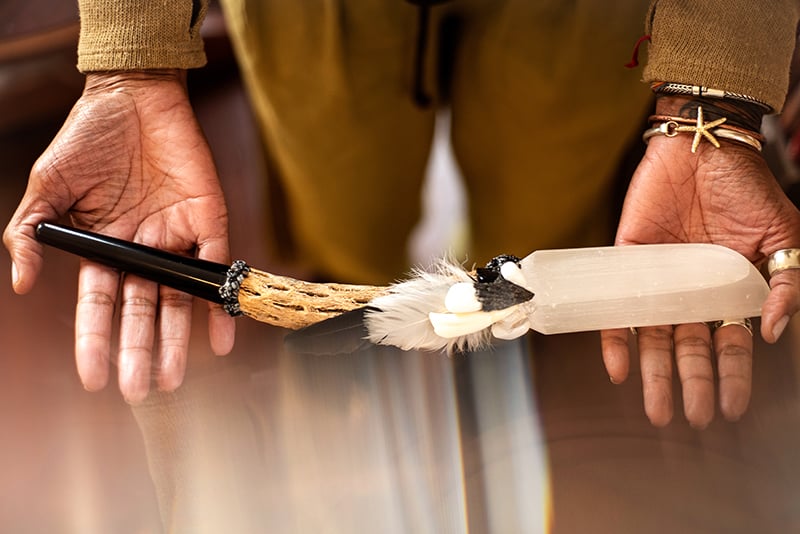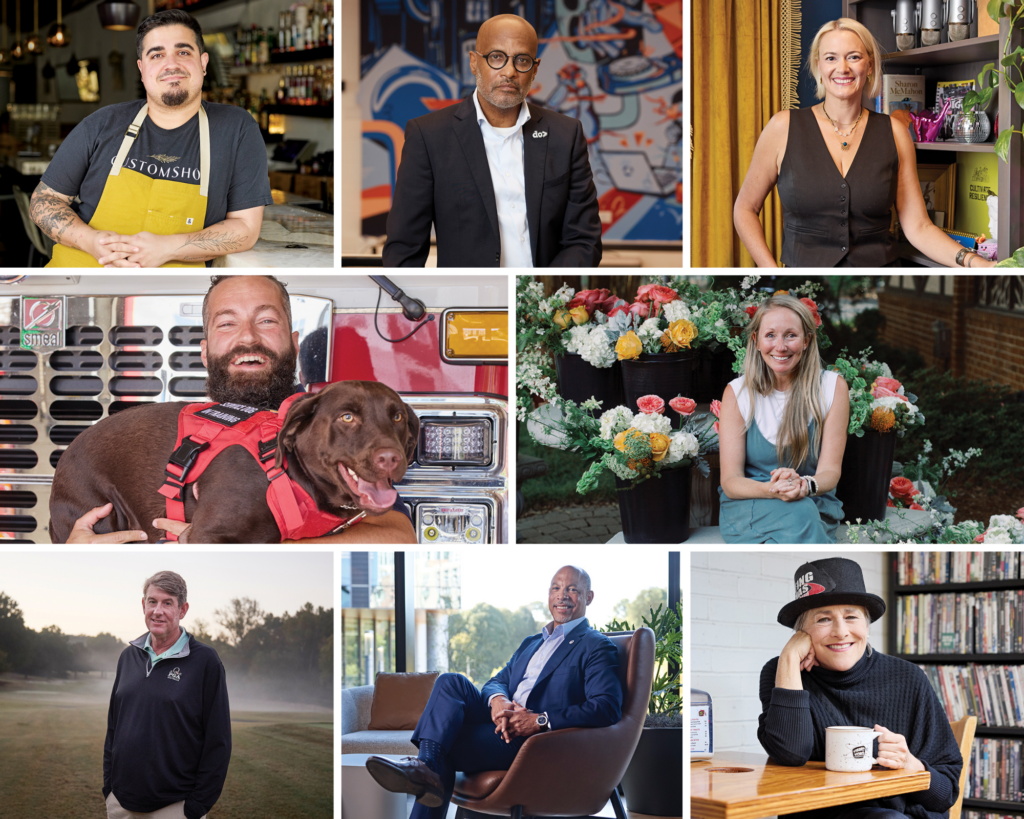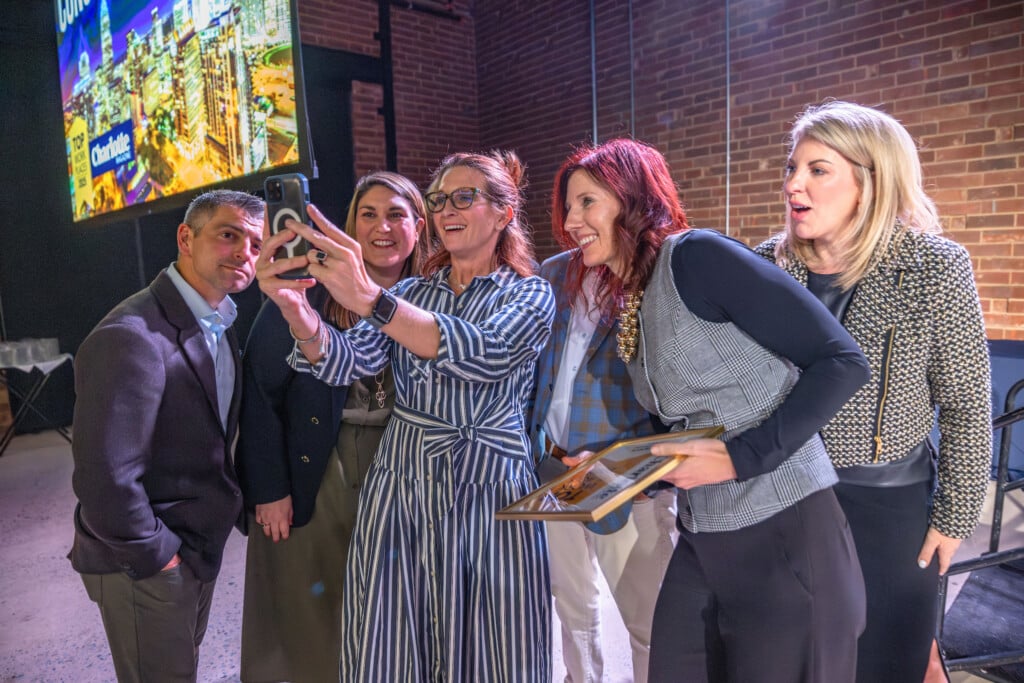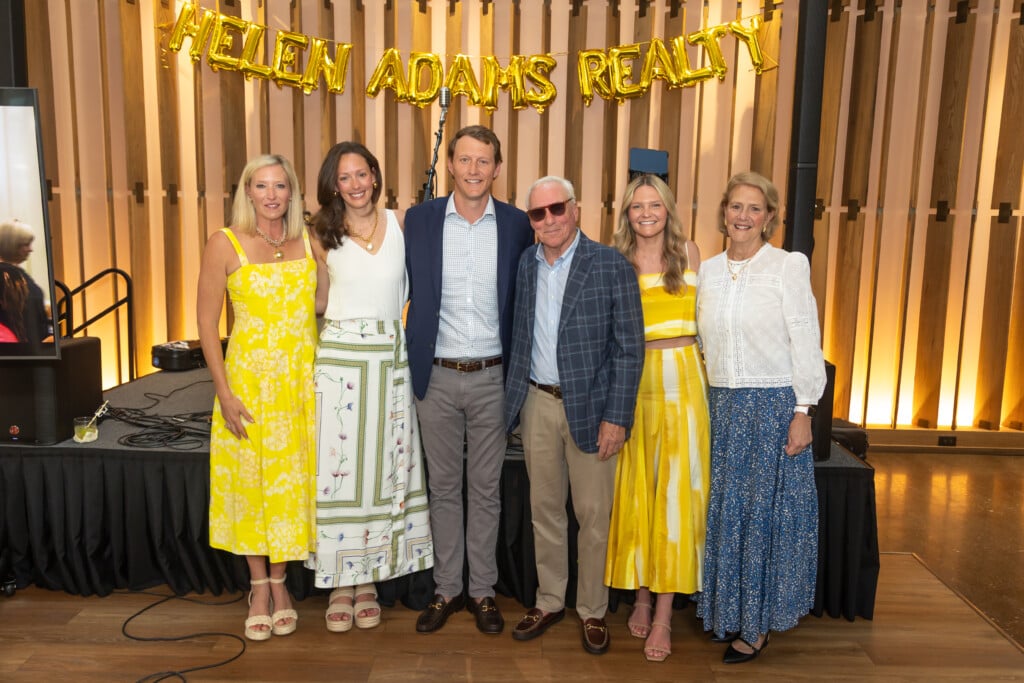The (Somewhat) Secret Society of Witches in Charlotte
Charlotte's assorted and mostly underground population of occultists works to summon self-empowerment, community, and acceptance—and retain its mystery

On a sunny Saturday morning in October, a young woman immersed herself in her bathtub. Dried agrimony and hyssop floated in the warm, salty water and clung to her dark skin. She swept them down and off her body to try to rid herself of the negativity that had plagued her life since she’d moved to Charlotte weeks earlier.
In her short time here, living in a luxury-advertised new-build apartment, she’d heard gunshots outside, had a stomach-turning cockroach infestation, and dealt with new appliances that didn’t work. Unable to get her landlord to respond, she’d turned to a pair of Charlotte’s many magic practitioners—or witches, as most people refer to them—for help.
BANG. The woman startled as the water around her rippled. She hopped from the tub and rushed into the kitchen to find the cover to an overhead light fixture on the floor, laid out like a body at a crime scene. It was the final sign.
At first glance, Curio, Craft and Conjure is like any other NoDa shop. The sun streams into the former mill building, illuminating original hardwood floors and exposed brick walls. An assortment of goods packs shelves and tables. But begin to browse, and you’ll realize how very much not like other stores it is. It’s stocked with jars of dried herbs, crystals, candles, incense, decks of tarot cards, sage bundles, voodoo dolls, ceremonial masks, crystal balls, bottled holy water, and—ah, yes—raccoon penis bones.
Gina and Gianna Spriggs opened it on Friday the 13th in July 2018. The store has made the Spriggses two of the most accessible magic practitioners in Charlotte, and when the woman with the crummy apartment needed help, she came to their shop.
Before Curio, Gina, now 62, had spent her career working in sales for soap and cosmetic manufacturers. Gianna, 31, is a trained chef who worked at Charlotte restaurants, including Church and Union (formerly Five Church) and Baku. But Gina’s practiced magic herself since she discovered it in her hometown of New York City in her early 20s, and Gianna grew up in Florida surrounded by her mother’s magic. Gina took her to metaphysical stores the way other moms take their kids to the mall.
After Gina divorced in 2009, she felt free to practice her magic more openly. She offered tarot card and other psychic readings for hire. By that time, she was living in Charlotte, and she noticed that Charlotte had few metaphysical stores—and none, she says, run by experienced practitioners who could offer their customers more than supplies.
Ten years passed. Gina continued to work in marketing but practiced magic with increasing frequency. Gianna grew up and went to culinary school.
One day in 2017, days after Gianna had put in her two weeks’ notice to leave her job as sous chef at the now-shuttered South End restaurant Zeppelin, her mom called. “She was like, ‘So, do you want to open a store together?’ And I was like, ‘Cool, I’ve got no other plans,’” Gianna, who’s louder and more direct than her mother, recalls with a chuckle. More like peers than mother and daughter, they add to each other’s statements but don’t correct one another.
We can’t know exactly how many are here, but local experts insist that Charlotte is full of witches, intuitives, and other occultists—people who have supernatural, mystical, or magical beliefs, practices, or interests. “Once you look,” says local occult expert Heather Freeman, “you realize they’re all over Charlotte. Like, we’re crawling with covens.” A collection of studies suggests that, as traditional religions have lost followers, paganism, which encompasses occult religions, has become one of the fastest-growing religious movements in the United States.
But in Charlotte, unlike older cities like New Orleans and San Francisco, you aren’t likely to realize the breadth and depth of occultism unless you have a direct connection to it. By definition, occult practices are kept away from public view to protect their magic and mysticism. (While they can speak broadly about their religions or practices with outsiders, many practitioners cannot share specifics about their rituals—much as college fraternities can’t share their initiation rituals.) Experts also say Charlotte’s unusual for the vast diversity of beliefs and practices here, which prevents a larger sense of community among occultists. We’re a city of transplants, with folks who consider themselves anything from Wiccan to New Age, and sometimes a mix of things. Some view their beliefs and practices as religious, other spiritual or psychological or secular. Some consider their practices magical, others staunchly don’t.
But that’s also what makes the occult population in Charlotte especially magical: Everyone does it a little differently, Freeman says. They often remix traditions from various cultures or belief systems to concoct something that serves them best, and the practitioners I met are remarkably respectful of others’ different practices. You can’t pick them out of a crowd, which adds to the mysticism; most don’t walk around wearing pentagrams or cloaks. “Your next-door neighbor or your banker or your friend or your dad might be an occultist,” says Sean McCloud, professor and chair of the religious studies department at UNC Charlotte, “and you don’t even know it.”
Charlotte’s occult community, though, has its challenges. This is a young Bible Belt city just a few decades after the heydays of Billy Graham and the Satanic Panic. We’ve come a long way, but occultists, esotericists, and magic practitioners still regularly encounter discrimination.
At Curio, Gina offers her intuitive readings, while Gianna cleanses people’s energy fields and helps them connect with their dead ancestors. They sell supplies for all kinds of occult practices from various cultures, from African to Celtic religions. (Most occultists she knows, Gianna explains, believe it’s acceptable for anyone to use any practice as long as they’re respectful and acknowledge its roots.) Both teach and host Zoom classes, on subjects ranging from “Successful Spellcasting” to “Egg Cleansing.” They offer general consults to help guide customers through any number of concerns, from finding a new job (a custom-carved candle lit on a specific night might help) to increasing fertility (they may recommend a tea and an offering to a goddess of fertility).
They have no shortage of customers. They do well enough to keep a sizeable store in NoDa, above Zämbies pizza and across the hall from Mac Tabby Cat Cafe. While there are no comprehensive studies on how many occult practices or practitioners live in Charlotte, Freeman has a better idea than just about anyone. She’s a digital media professor at UNC Charlotte and the founding director of the university’s Center for Magic, Esotericism, and Occulture. She’s spent a decade studying occult and esoteric practices and, in October 2023, launched a podcast on the topic, Magic in the United States, now in its third season. She also practices magic, including initiatory Wicca.
Even so, the Charlotte public isn’t exposed to occult practices in daily life. Esoteric practitioners don’t proselytize, and there’s no ancient text instructing them to convert as many people as possible. In fact, many occult religions, like initiatory Wicca, require the opposite. When Freeman was initiated into her first coven—she now leads her own—a decade ago, she had to take an oath of secrecy not to talk about the specifics of its rituals, gods, or other members with anyone outside the coven. “That’s not meant to be kind of creepy and gatekeeping,” Freeman says. “It’s really there to protect the experience.”
But mysticism comes at a cost: It inhibits community among occultists. Practitioners form small communities through covens like Freeman’s and shops like Curio, but the combination of furtiveness, the wide variety of practices, and lingering stigma prevents the larger population from connecting. And how can stigma die without exposure?
“I think when a lot of people think of the term ‘occult,’ they hear ominous music—maybe drone metal—and see dark figures with hoods like it’s a horror movie,” says religion professor McCloud. But the occultists I met strive for the same things most religious practitioners do: to make sense of life, find direction, and better themselves.
It’s a couple of weeks before Halloween, and four men and one woman stand around a table as the moon rises. The tallest wears a floor-length, blood-red robe with a pentagram on the chest. The table is spread with an offering for the group: pumpkin-shaped bowls of candy corn, orange alcoholic punch, individually wrapped Reese’s cups, and chips.
“By the way,” the woman, Freeman, tells me as she gestures toward her husband, “the one wearing the pentagram is the only one of us not really into the occult.”
We’re in the home of another UNCC professor, one of Freeman’s friends and colleagues, in the Highland Creek subdivision in northeast Charlotte. This social group calls itself the Occult Salon, and tonight’s gathering is a Halloween karaoke party in lieu of the usual monthly meeting at Petty Thieves Brewing.
“I just wanted to have a space where I hung out with and talked to other occultists about other practices and things to do,” Freeman says. She launched the Occult Salon with a few friends in October 2022. It’s since grown to a group of 15, and members are interested in various practices and belief systems. At their meetings, they chat about everything from tarot cards and divination systems to historical magical texts over stouts and IPAs.
“One of the things that we talk about sometimes is whether or not to make the Salon a Meetup,” Freeman says as we move from the kitchen to the living room, referring to the website for publicizing events. “But one of the challenges in occult spaces is that there is sometimes a kind of fine line between mystical experience and mental health.” That, and she knows that occult practices tend to piss off some people off. “I just think that if you advertise a Meetup for an ‘occult salon’—I don’t know. I’m not a giant, beefy woman.” The 50-year-old is petite and unassuming, with sweeping light-blond hair and small hands that she frequently tucks into her sweatshirt pockets.
As a professor, academic expert, and podcast host, she often gives public talks on occult topics. Not everyone attends out of interest or support. “Even last night,” she says, “I was giving this talk about a magical text … and the relationship between magic and religion and spirituality, and this guy comes up to me afterwards, and he was very nice, but he was like, ‘Your talk made me uncomfortable.’” He proceeded to tell her about his belief in Jesus Christ. “That stigma is still there,” Freeman says. “If I’d been talking about Islam or Buddhism or Hinduism, I don’t think I would’ve had that same experience. It’s always sobering.”
Discrimination directed at occultists isn’t new. Historically, colonizers used the term “magic” as a pejorative to describe the practices of marginalized groups they didn’t understand. When European settlers arrived in North Carolina, they used it to describe the cultural and spiritual practices of indigenous people. Later, they lumped African and African diaspora religions, brought to the United States via the slave trade, under the term, too. This is why, Freeman says, it’s important not to label someone’s practices as magic unless they do.
“They weren’t calling themselves witches,” Gina Spriggs says. “Somebody made up that word. But I embrace it, just like Black people use the N-word in rap music. I embrace the word ‘witch’ because you’re going to call it to me behind my back anyway, so let me just call it to myself.”
Despite the fact that they’re obviously smart and eloquent, both Gina and Freeman say they often have to defend their intelligence, too. “People think that witches are not particularly bright people who just walk around with crystals in their bras or whatever,” Gina says. Not only does she have an extensive knowledge of nature, she points out, but “I also teach a class where I use quantum physics phenomena to help people understand how magic works. … What we do is based on science. Magic is science with a side order of spirit.”
In summer 2022, Sasha Davis, 34, founded Charlotte’s Pagan Education Center to create community among occultists and educate the public. A “professional witch” and “eclectic chaos practitioner,” she says she felt the need for community but couldn’t find one that suited her. “My husband told me, ‘If you can’t find what you want, create it.’” Today, Davis says, the center hosts online and in-person occult and education events and has about 1,500 members.
It’s not unusual for women to rush up the stairs and through the doors of Curio to ask Gina and Gianna to help them hex ex-boyfriends. “I have to tell them, ‘We don’t do that,’” Gina says in a tone that sounds like she’s gentle-parenting a toddler. “The work that we’re doing is to help people help themselves and to come into their own power.”
The Spriggses keep a couple of barstools by the counter where people can sit and talk, even if they don’t buy anything. Sometimes, people seek advice for a specific problem; sometimes, they just want someone to listen. Years ago, someone brought in a cat they couldn’t care for anymore. (Gina still has him. His name is High John, after a hoodoo deity.) In September, a woman who was homeless came in, and Gina took her across the street, bought her lunch, and listened like a therapist would. And the Wednesday before I met the Spriggses, the recent Charlotte transplant with the problem apartment had come in, seeking whatever help she could get.
It was almost closing time, and Gianna was alone in the shop. She sat the woman down and listened to her story. She recalls that the woman felt trapped in her new city, wondering if she’d made an enormous mistake. Gianna suspected someone from back home might be sending negative energy the woman’s way because they wanted her to return home. She recommended the woman take a spiritual bath, a ritual used by magic practitioners to cleanse or protect the soul, using Curio’s house-made Hex Breaker salts with herbs “good for breaking hexes and jinxes.”
The following Saturday, the woman returned to the shop to update the Spriggses—on the falling light and her negotiations with the landlord to break her lease. She planned to move the next month.
Gianna and Gina both believe the roaches, failing appliances, and falling light were signs from the universe that the woman was not living in the right space for her spirit. I suspect it was simply a crappy apartment that wasn’t up to the standards it advertised. (That wouldn’t be a first for Charlotte.) Either way, the Spriggs’ advice and support emboldened a young woman to stand up to her negligent landlord. They listened to the woman when she had no one else and helped her help herself. And that, Gina says, is what magic is all about.











